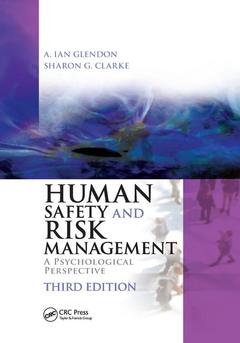Human Safety and Risk Management (3rd Ed.) A Psychological Perspective, Third Edition
Auteurs : Glendon A. Ian, Clarke Sharon

The third edition of a bestseller, Human Safety and Risk Management: A Psychological Perspective incorporates a decade of new research and development to provide you with a comprehensive and contemporary guide to the psychology of risk and workplace safety. A major enhancement is reflected in the new subtitle for the book, A Psychological Perspective, which highlights both the expertise of the authors and also confirms the predominantly psychological orientation of the revised text.
New in the Third Edition:
- State-of-the-art theory reviews, research findings, and practical applications
- New chapter on impact that sensor technologies have on approaches to safety and risk in contemporary society
- Enhanced chapters on key issues around sensing danger, risk perception, error detection, safety culture, risk management, leadership, teams, and stress management
This book discusses how people perceive and manage risks and how to make the workplace a safer place. It examines the influence of individual factors on safety, as well as team and organizational factors at work, from a psychological perspective. It also highlights changes in safety due to the changing workplace, globalization, and managing employees? safety and health beyond the workplace ? a challenge that many organizations have yet to address. Reflecting current scientific research across a range of disciplines as it applies to human safety and risk management, this book helps you meet the challenges posed by the rapidly evolving workplace.
Introduction. Sensing Danger. Sensor Technology. Perceiving Risk. Reframing Error. Surviving Stress. Personality Impacts. Group Climate. Safety Leadership. Safety Culture. Managing Risk. References. Glossary.
Ian Glendon is in the School of Applied Psychology, Griffith University Gold Coast Campus, Queensland, Australia. His research interests include risk management, safety culture, occupational health and safety, personality and safe behavior, and driver behavior/driver stress. As well as co-authoring the previous two editions of Human safety and risk management, he has over 100 refereed publications and three other books, his work being extensively cited. He has supervised over two dozen research higher degree students and completed numerous research contracts. He has consulted for over 80 clients on topics including safety culture, accident/incident analysis, task analysis, human error/reliability analysis, and safety auditing. An elected Fellow of the International Association of Applied Psychology (IAAP), and of the Institution of Occupational Safety and Health, his other professional memberships include Chartered Occupational Psychologist (UK), and Chartered Ergonomist & Human Factors Specialist (UK). He is a former president of the IAAP Division of Traffic and Transportation Psychology.
Sharon Clarke is Professor of Organizational Psychology at Manchester Business School, University of Manchester, UK. She gained a First Class BA degree in Psychology (Manchester, 1990) and PhD in Organizational Psychology (Manchester, 1993), before becoming a lecturer in Applied Psychology at Aston University, and later joined UMIST (now the University of Manchester) in 1996. She has research interests in safety culture, safety climate, leadership, personality, occupational stress, well-being and health. Her work has been widely published in leading academic and practitioner journals, national and international conferences, and co-authored and edited books. She has held a number of funded research grants, including from the Institute of Occupational Safety and Health, UK government grants and industry funding. She is currently As
Date de parution : 07-2017
17.8x25.4 cm
Date de parution : 10-2015
17.8x25.4 cm
Thèmes de Human Safety and Risk Management :
Mots-clés :
Summary Text; Safety Climate; Risk assessment; Positive Safety Climate; Risk psychology; Group Safety Climate; Health and Safety at Work; Injury Involvement; Workplace safety; Work Injuries; Occupational Health and Safety; Safety Culture; Risk management; High LMX Relationship; Transformational Leadership; Positive Safety Culture; Safety Citizenship Behaviors; Risk Risk Trade Offs; Low LMX Relationship; High Neuroticism Individuals; Active Transactional Leadership; Emotional Exhaustion; TPB Model; Group Level Safety Climate; Accident Involvement; USS Vincennes; Sensation Seeking; Safety Leadership; Safety Participation; Transactional Leadership; External LoC



